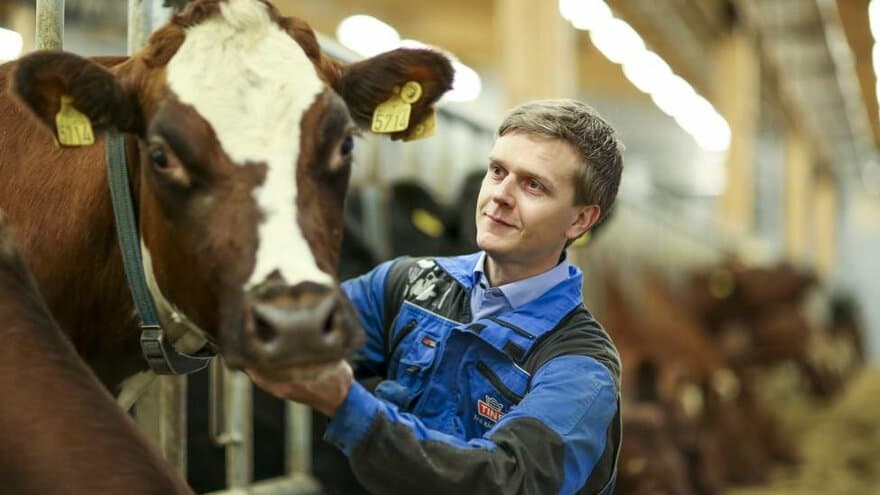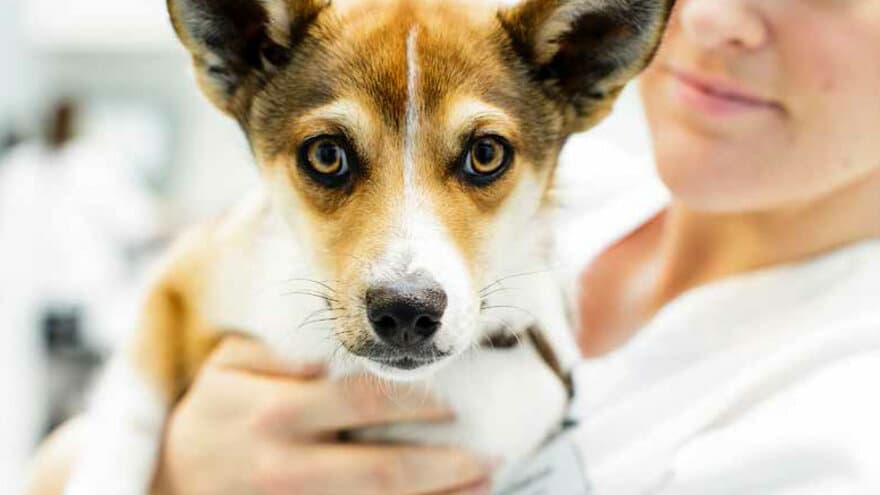Doctoral degreeFull timeVeterinary Science
ECTS credits:
180
Start of Studies:
Continuously


The objective of the PhD education is to give candidates knowledge, skills and expertise in line with the Norwegian qualifications framework.
Career opportunities
On completion of the PhD programme in Veterinary Science, new doctors are expected to have in-depth knowledge in the chosen subject area within the PhD programme of study in Veterinary Science, and to be at the forefront of knowledge in their field of expertise within this discipline.
Learning outcomes
KNOWLEDGE
On completion of the PhD programme in Veterinary Science, new doctors are expected to:
- have in-depth knowledge in the chosen subject area within the PhD programme of study in Veterinary Science, and to be at the forefront of knowledge in their field of expertise within this discipline
- have in-depth knowledge about scientific theories and methods associated with the field
- be able to assess and analyse different theories, methods and processes in research and academic development projects - also from an international perspective
- contribute to the development of new knowledge, new theories and methods in the field
SKILLS
On completion of the PhD programme in Veterinary Science, new doctors are expected to:
- be able to formulate issues, and plan and conduct research and academic development work of high international calibre within their field
- know how to use the scientific equipment, instruments and analysis tools of their field of specialisation, and master equipment normally used by researchers
- master relevant statistical methods and be able to assess the utility and limitations of different statistical methods
- have conducted original research that has led to new knowledge that can be published in the form of academic articles in international peer-reviewed journals
- be able to handle complexity, create an overview, and synthesise scientific information
- be able to perform critical assessments and give constructive criticism on scientific work in their field
GENERAL COMPETENCE NORWEGIAN UNIVERSITY OF LIFE SCIENCES UNIVERSITY BOARD
On completion of the PhD programme in Veterinary Science, new doctors are expected to:
- be able to conduct their research with professional and ethical integrity, take into consideration animal welfare and environmental issues, and be able to identify new relevant ethical questions
- be able to participate in complex interdisciplinary tasks and projects
- be able to disseminate research and development work through recognised national and international channels, and participate in scientific debates in international forums
- be able to disseminate the results of their research work to the livestock or aquaculture industry, the authorities and public administration, and to the general public through contact with the media
- be able to place own research in larger academic and societal contexts
- be able to assess the need for and, if required, stimulate innovation in the field
Exchange possibilities
NMBU facilitates national and international exchanges. Part of the doctoral work or doctoral courses may be taken at other Norwegian or foreign academic institutions when it can be incorporated into the plans, and funding has been secured.Program structure
The PhD programme in Veterinary Science is regulated by the Regulations for the Degree of Philosophiae Doctor (PhD) at the NMBU and Supplementary rules at VET.
You can find information about the PhD programme here: https://www.nmbu.no/en/studies/study-options/phd/veterinary-sciences.
ADMISSION
Information about the admission process: https://www.nmbu.no/en/faculties/faculty-veterinary-medicine/veterinary-science-admission
Admission to the PhD programme is formalized through a written agreement as well as an education plan and data management plan no later than four (4) month after the start of PhD funding period. The education plan must include a project description.
REQUIRED COURSEWORK
The education plan must contain subjects at the PhD or Master's level and make up a total of 30 ECTS. A course in research ethics and philosophy of science conferring minimum five credits must be included. In addition the Faculty has two more compulsory courses.
The candidate's plan for carrying out the required coursework will be approved in accordance with the section 8-2 in the Supplementary rules at VET.
If changes are made to the required coursework, an application must be submitted for changes to the required coursework.
THE SUPERVISORY TEAM
The supervisory team must consist of a main supervisor and normally 1-2 co- supervisors.
All supervisors must hold a doctoral degree, or hold an assessed associate professorial or professorial competence, within a relevant academic field and be working actively as researcher.
The main supervisor must be an employee of NMBU and have previous experience or training in serving as supervisor for PhD candidates. When academic considerations specifically require, an external main supervisor may be appointed. Reasons must be given, and the appointment must be based on a written agreement between the main supervisor’s employer and NMBU. A co-supervisor from the Faculty must be appointed if the Faculty appoints an external main supervisor.
RESEARCH WORK IN CONNECTION WITH THE PROGRAMME OF STUDY
The research work shall be an independent, scientific work that fulfils international standards and is of high academic quality (section 10 of NMBU's Regulations). The work will be planned and carried out in consultation with the supervisors and any external partners. A realistic milestone plan must be drawn up, so that the work can be completed, and the thesis submitted by the end of the contract period. The principal supervisor has general responsibility for ensuring that the plan is realistic.
The progress of the research work must be reported in the annual progress report.
THESIS AND PUBLIC DEFENCE
The thesis shall be an independent, scientific work that fulfils international standards and is of high academic quality in terms of the formulation of research questions, the specification of concepts, the methodological, theoretical and empirical basis, documentation, the use of literature and the form of presentation. The thesis shall contribute to the development of new knowledge in the chosen field and must be of such quality as to qualify for publication as a part of the scientific literature in the field (section 10 of NMBU's Regulations).
The doctoral thesis normally consists of three academic articles that can be published in scientific journals. The articles should be published or accepted for publication before submitting the thesis, but this often is not realistic within a three-year period. However, the articles must as a minimum have the same standard as a manuscript that is submitted to a journal for the first time. The PhD candidate must be the lead author of at least two of the articles. An extended abstract must also be written, in which the PhD candidate displays thorough knowledge of the field, and an ability to synthesise scientific findings and discussions from different articles. The PhD candidate shall write this section on his/her own. The thesis must also be written and submitted in accordance with the rules in sections 10 and 13.1 of NMBU's Regulations, and authorship declarations must be enclosed for each scientific article.
The public defence will begin with a trial lecture on a topic that is assigned to the PhD candidate 10 working days in advance. The lecture must last 45 minutes, and be of a standard that corresponds to a lecture for master's degree students in the subject. Two external opponents will then critically review the thesis, and assess the candidate's responses. The evaluation and the work of the evaluation committee must comply with the rules in sections 12 and 15 of NMBU's Regulations.
USE OF AI IN THE DOCTORAL DISSERTATION
At NMBU, it is expected that doctoral candidates understand and adhere to the academic norms of integrity, accountability, and transparency. They are to produce independent research works that meet international standards for academic level, ethical requirements, and methodology within their respective fields (Regulations for the PhD degree at NMBU, 2025, §10-1). This means that candidates are responsible for all content in the doctoral dissertation, including text, data, graphics, illustrations, code, and analyses. It is permitted to use tools based on artificial intelligence (AI) in the work with both the thesis, articles, and other parts of the dissertation. The use of AI-based software must be responsible, transparent, and safeguard privacy requirements. Doctoral candidates must ensure that AI-generated information is reliable and follows academic norms, and the use of AI must be disclosed. Note that AI is a tool, not a co-author. The regulations for academic misconduct also apply to the use of AI and AI-generated text, making it crucial to critically evaluate and ensure the reliability of AI-generated sources. The use of AI must comply with NMBU's guidelines for responsible use of AI in doctoral dissertations.
SUPPORT FUNCTIONS AND INFRASTRUCTURE
The Faculty of Veterinary Medicine has its own PhD programme council. The PhD programme council shall develop and strengthen the PhD education at the Faculty. In addition, the PhD programme council assists the four departments with execution of the PhD education.
The Faculty of Veterinary Medicine's IT staff will buy computers for the PhD candidates, offer support, and provide access to software, printers and the Internet.
The PhD candidates will have office space at the Faculty of Veterinary Medicine. The principal supervisor will arrange for space in the laboratory when this is required.
More about the program
Societal relevance
The PhD programme shall qualify candidates for research work within veterinary science, including animal welfare, food safety, and "one health" problems, as well as other work where there are high demands on scientific insight regarding production animals, fish, and companion animals. The PhD programme seeks to meet the current and future needs for competence in order to conduct research, development and dissemination at universities, other public and private institutions, enterprises and organisations. The PhD candidate will complete an education that offers deeper and broader competence, based on a relevant master's degree or programme of professional study. The PhD candidate will carry out an independent work of research that will lead to a scientific thesis of high academic quality. The candidate must learn critical thinking skills, academic collaboration, and how to disseminate knowledge.Learning activities
MEANS OF ACQUIRING THE KNOWLEDGE
- The required coursework of at least 30 academic credits, which offers comprehensive in-depth competence.
- Reading and keeping updated on literature within his/her field of specialisation.
- The research work.
- Work on the extended abstract of the thesis, where the candidate has independently written an introduction that provides a theoretical and practical background for the research work, discusses and justifies the choice and use of research methods and puts the results as a whole in an international perspective.
MEANS OF ACQUIRING THE SKILLS
- Participating in planning and shaping the PhD project in detail and, if applicable, participating in the planning of new project applications.
- Supervision and own research, where the PhD candidate actively benefits from the competence of the supervisory team.
- Developing his/her own international academic network outside the supervisory team.
- Attending courses on research methods and writing, when required.
- Working on publications, submissions to journals, handling of remarks from referees, and working on the thesis.
- Participating in peer review of scientific manuscripts, giving feedback on colleagues' manuscripts, and attending seminars where the ideas and results of other PhD candidates and researchers are discussed.
MEANS OF ACHIEVING GENERAL COMPETENCE
- Taking a course on research ethics of a scope of at least 5 credits.
- Supervision and own research.
- Working on publications and the thesis.
- The trial lecture, by familiarising him/herself with a specified topic quickly, time management, searching for/selecting/evaluating/processing information, and giving an oral presentation of the specified topic.
- Presenting own research findings at national and international scientific conferences.
- Giving lectures at national academic meetings.Give interviews on the radio, TV, newspapers, other journals or web sites.
- The required coursework of at least 30 academic credits, which offers comprehensive in-depth competence.
Examination
The degree of philosophiae doctor (PhD) is conferred on the basis of:
- approved completion of the required coursework
- an approved doctoral thesis
- an approved trial lecture on a specified topic
- an approved public defence of the doctoral thesis (disputation)
See section 12 of NMBU's Regulations.
FORMS OF EVALUATION
The required coursework is evaluated using different forms of evaluation, such as an oral or written examination, submitting assignments or a semester paper. The department head monitors progress by means of the annual progress reports and the compulsory seminars (start-up seminar, midway assessment and final seminar). Other input to learning outcomes does not need to be evaluated, but the principal supervisor is responsible for ensuring that the objectives are met through relevant measures, academic discussions and steps towards dissemination work within the time frame of the doctoral work.
- approved completion of the required coursework
Cooperation with other institutions
<p>The academic communities at the Faculty of Veterinary Medicine participate extensively in international research projects, and international experts in the different fields participate in our projects. Each principal supervisor has a professional network that includes foreign researchers. They are actively brought into PhD projects when relevant, so that the PhD candidate also develops an international network during their PhD education. Almost all PhD candidates at the Faculty of Veterinary Medicine attend international conferences, which helps them expand their professional networks.</p><p>The PhD programme in Veterinary Science is a doctoral programme that will educate independent researchers of international calibre in conjunction with national and international research communities. Each PhD candidate is assigned a principal supervisor and one or more academic co-supervisors. Supervisors are encouraged to form networks that include highly competent co-supervisors from foreign universities.</p>
Study advisor(s):
